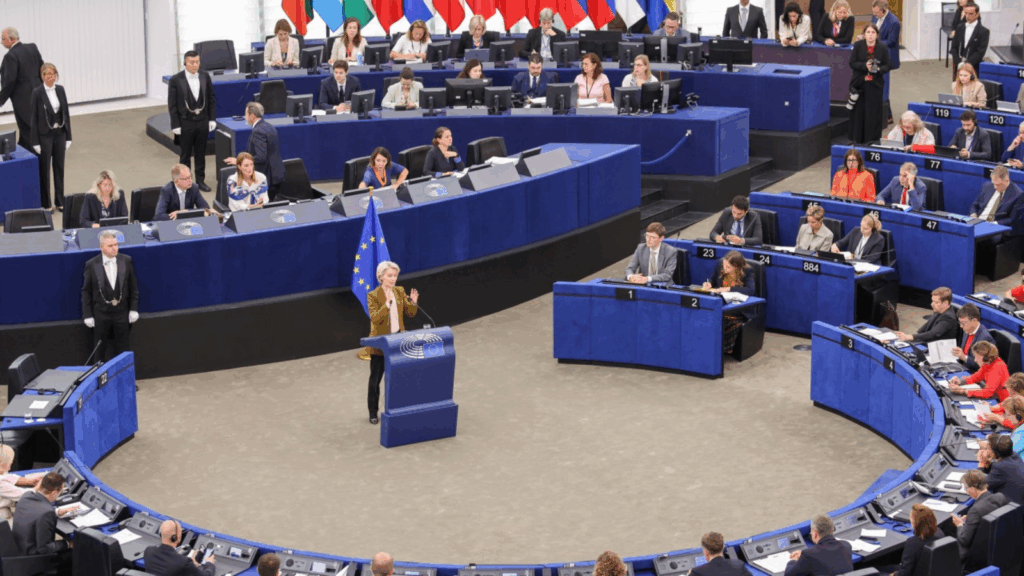On the 20th of June, the European Commission proposed a mid-term revision of the EU’s long-term budget, the Multiannual Financial Framework (MFF) 2021-2027.
The purpose of the Multiannual Financial Framework is to guarantee that the EU’s spending grows in a structured way and remains within the boundaries of its available funds. It also establishes guidelines that the EU’s yearly budget must adhere to. The MFF Regulation defines maximum spending limits for various general areas of expenses known as headings.
Although the budget’s multiannual character ensures stability and predictability, it faces constraints in effectively addressing significant unforeseen events due to its limited capacity. The reason for the proposed revision stems from the unprecedented and unexpected challenges faced by the EU since the adoption of the MFF in 2020. Firstly, the Russian invasion of Ukraine has forced the EU to redirect an increasing amount of resources to support Ukraine. Secondly, the EU has been forced to strengthen its investments in strategic technologies after international trade developments, particularly the United States’ investments in favour of the green transition. Finally, transnational migration has continued at full speed, requiring increasing spending to strengthen cooperation with partners and manage the influx of third country nationals.
The European Commission requested that Member States boost their budget contributions by around 65,8 billion euros as part of the midterm adjustment of the Multiannual Financial Framework (MFF). The Member States are being asked for additional funding in an unprecedented manner. Comparatively, the 2016 revision did not affect the total ceiling; it simply called for a reorganisation of EU resources internally (for around 6 billion euros). Once approved, roughly half of the additional funds will go towards aiding Ukraine’s rehabilitation and bolstering both internal and external migration priorities, with the remaining funds going towards covering rising Next Generation EU costs and enhancing EU competitiveness.
The Commission suggested raising the MFF by 75 billion euros over the final three years, 2024 to 2027, in order to take account of these developments. The Own Resources Decision (ORD), a legislative act that defines how the EU budget is financed, would also need to be adjusted in order to match this rise in EU budgetary spending, which is anticipated to result in an average yearly increase in EU income of 36 billion euros between 2028 and 2030. The Commission specifically suggested to the Council to enhance the revenue from the EU Emission Trading System (ETS) and at the same time to boost the percentage flowing to the EU budget from sales of the recently formed Carbon Border Adjustment Mechanism (CBAM).
The MFF revision proposal presented by the Commission covers a targeted set of political priorities and necessary technical adjustments to ensure that the MFF delivers until the end of the period:
- Most notably, the Commission proposed establishing a new Ukraine Facility worth €50 billion, which constitutes 2/3 of the budgetary increase proposed by the Commission. The Ukraine Facility is meant to support Ukraine on its European path and to cater for its immediate needs and recovery. The instrument is built to provide both repayable support (loans) and non-repayable support (grants and guarantees).
- Furthermore, the Commission proposed the creation of the Strategic Technologies for Europe Platform, (STEP) which will seek to reinforce, leverage and steer EU funds to investments in deep and digital, clean and bio technologies, which are essential for Europe’s leadership. The STEP will be funded by reallocating funds already available under the cohesion policy and industrial policy and an additional increase of the budgetary allocation by €10 billion.
- Additionally, the Commission proposes to increase Heading 4 of the MFF “Migration and Border Management” by €2 billion, Heading 6 “Neighbourhood and the World” by €10,5 billion and the Solidarity and Emergency Aid Reserve (SEAR) by €2,5 billion in order to deepen global partnerships, respond to emergencies and to manage needs related to migration. Furthermore, it will furnish the essential means to carry out the New Pact on Migration and Asylum, assist Syrian refugees in Turkey and neighbouring areas, ensure continued Macro-Financial Assistance in neighbourhood countries and contribute to the Neighbourhood, Development and International Cooperation Instrument (NDICI-GE).
In more details:
On Ukraine
The Macro-Financial Assistance+ (MFA+) Instrument for Ukraine, which the EU authorised in December 2022 and with a budget of only 18 billion euros for 2023, is actually the blueprint for the new 50 billion euro Ukraine Facility. The European Peace Facility (EPF), an off-budget instrument with a cap of 5.7 billion euros, was established by the EU in 2021 and serves as a foundation for the Ukraine Facility. The EU has used EPF financing to support the Ukrainian military seven times since the war began, necessitating two increases in the EPF budget, which is currently 12 billion euros, more than double the initial sum. However, the MFA+ Instrument is funded by the issuing of shared EU debt by the European Commission, as is the case with NGEU, whereas the EPF is dependent on financial contributions made by member states depending on GDP. The “Ukraine reserves” (grants and guarantees backed by the EU budget) and loans that will be covered by financial markets will be used to fund the Ukraine pillar. Member States will be expected to contribute a minimum of 2.5 billion euros total annually, up to a maximum of 50 billion euros for the years 2024 to 2027, to the Ukraine reserves (the grants’ portion). The EU budget will get 17 billion euros in contributions (for grants) as a result, while the market investments will generate roughly 33 billion euros in loans. This is the largest financial instrument the EU has ever developed for a third country, claims Agence Europe.
On the new Asylum and Migration Pact
In light of recent Pact developments, the Commission is recommending that Heading 4 “Migration and Border Management” be increased by 2 billion euros for the years 2024 to 2027. The sum equates to a 10% overall increase for this MFF chapter from 2021 to 2027. The European Commission is running out of resources to use for other goals due to the displacement of Ukraine in 2022, and nearly all of the reserves available under the Thematic Facility were used to offer emergency assistance to Member States bordering Ukraine. According to the current proposal, the major goals appear to be to support the accountability and “financial solidarity” aspects of the Pact, which include screening and border processes, returns, as well as reception and relocations.
With a proposed increase of 10.5 billion euros (or nearly 10% more of the entire budget under Heading 6 “Neighbourhood and the World”), the main budget increase on migration will have an impact on external policies. The Commission argues that the increase is necessary to: (1) maintain the same levels of funding provided under the Neighbourhood, Development, and International Cooperation Instrument (NDICI) for the European Trust Fund for Africa (especially to deepen cooperation with countries from the Southern Neighbourhood to increase returns); (2) support nations hosting Syrian refugees, such as Lebanon, Turkey, and Jordan; and (3) provide assistance to partner nations, such as the United States. The proposal also contains an additional 2.5 billion euros for the Solidarity and Emergency Aid Reserve to confront natural catastrophes and public health emergencies, which will be added to the humanitarian aid funds that would be depleted for help to the earthquakes in Syria and Turkey.
The European Parliament’s co-rapporteurs of the MFF held a press conference where they commented on the proposed revision. The views from the Parliament on the revision were positive since they had requested a revision of the MFF and the budget increase would bring the MFF closer to the amount that was demanded by the Parliament. The European Parliament’s position on the matter was set out previously in a resolution adopted on 15 December 2022. The EP will assess and respond to the Commission’s proposals in the next steps.
What is next?
The negotiations for the MFF, including the Parliament’s approval, need to be completed before the year ends in order to address the current budgetary pressures and allocate funds for supporting Ukraine, migration, external needs, and competitiveness starting in January 2024. The Commission relies on the Spanish Presidency of the Council to reach a speedy compromise after summer. This agreement could then be endorsed by the Council in October. On the basis of the feedback received on the MFF, the Commission stands ready to amend its draft proposal for 2024.
For more information, please visit the Commission’s website.
You can find more details about the Parliament’s conference on our website.
To learn more about current calls for proposals or Eurodiaconia’s funding events, please don’t hesitate to get in touch with our Projects and EU Funding Officer Giorgia Signoretto at , or with our Projects and Research Assistant Alice Widerberg at



